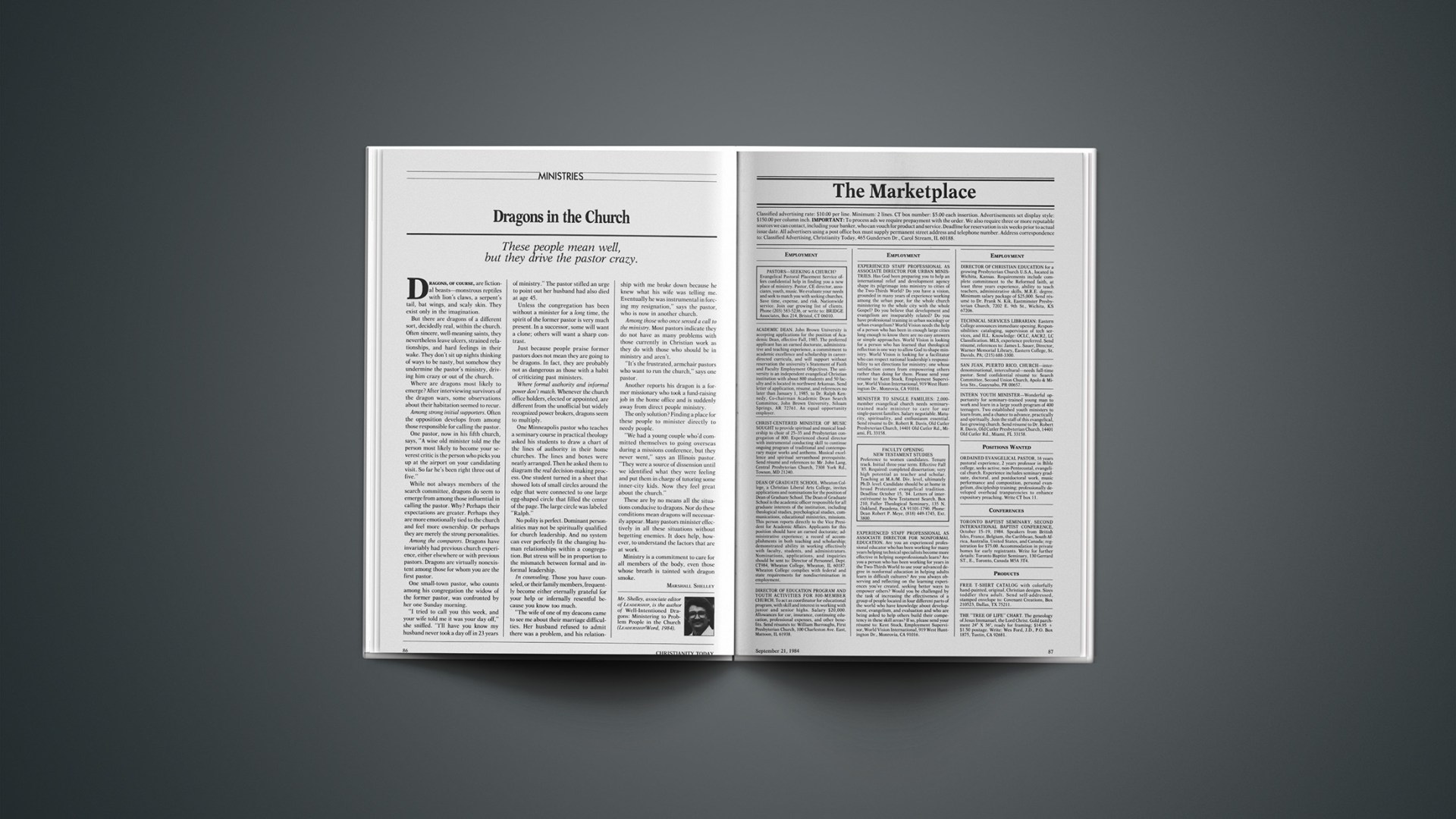These people mean well, but they drive the pastor crazy.
Dragons, of course, are fictional beasts—monstrous reptiles with lion’s claws, a serpent’s tail, bat wings, and scaly skin. They exist only in the imagination.
But there are dragons of a different sort, decidedly real, within the church. Often sincere, well-meaning saints, they nevertheless leave ulcers, strained relationships, and hard feelings in their wake. They don’t sit up nights thinking of ways to be nasty, but somehow they undermine the pastor’s ministry, driving him crazy or out of the church.
Where are dragons most likely to emerge? After interviewing survivors of the dragon wars, some observations about their habitation seemed to recur.
Among strong initial supporters. Often the opposition develops from among those responsible for calling the pastor.
One pastor, now in his fifth church, says, “A wise old minister told me the person most likely to become your severest critic is the person who picks you up at the airport on your candidating visit. So far he’s been right three out of five.”
While not always members of the search committee, dragons do seem to emerge from among those influential in calling the pastor. Why? Perhaps their expectations are greater. Perhaps they are more emotionally tied to the church and feel more ownership. Or perhaps they are merely the strong personalities.
Among the comparers. Dragons have invariably had previous church experience, either elsewhere or with previous pastors. Dragons are virtually nonexistent among those for whom you are the first pastor.
One small-town pastor, who counts among his congregation the widow of the former pastor, was confronted by her one Sunday morning.
“I tried to call you this week, and your wife told me it was your day off,” she sniffed. “I’ll have you know my husband never took a day off in 23 years of ministry.” The pastor stifled an urge to point out her husband had also died at age 45.
Unless the congregation has been without a minister for a long time, the spirit of the former pastor is very much present. In a successor, some will want a clone; others will want a sharp contrast.
Just because people praise former pastors does not mean they are going to be dragons. In fact, they are probably not as dangerous as those with a habit of criticizing past ministers.
Where formal authority and informal power don’t match. Whenever the church office holders, elected or appointed, are different from the unofficial but widely recognized power brokers, dragons seem to multiply.
One Minneapolis pastor who teaches a seminary course in practical theology asked his students to draw a chart of the lines of authority in their home churches. The lines and boxes were neatly arranged. Then he asked them to diagram the real decision-making process. One student turned in a sheet that showed lots of small circles around the edge that were connected to one large egg-shaped circle that filled the center of the page. The large circle was labeled “Ralph.”
No polity is perfect. Dominant personalities may not be spiritually qualified for church leadership. And no system can ever perfectly fit the changing human relationships within a congregation. But stress will be in proportion to the mismatch between formal and informal leadership.
In counseling. Those you have counseled, or their family members, frequently become either eternally grateful for your help or infernally resentful because you know too much.
“The wife of one of my deacons came to see me about their marriage difficulties. Her husband refused to admit there was a problem, and his relationship with me broke down because he knew what his wife was telling me. Eventually he was instrumental in forcing my resignation,” says the pastor, who is now in another church.
Among those who once sensed a call to the ministry. Most pastors indicate they do not have as many problems with those currently in Christian work as they do with those who should be in ministry and aren’t.
“It’s the frustrated, armchair pastors who want to run the church,” says one pastor.
Another reports his dragon is a former missionary who took a fund-raising job in the home office and is suddenly away from direct people ministry.
The only solution? Finding a place for these people to minister directly to needy people.
“We had a young couple who’d committed themselves to going overseas during a missions conference, but they never went,” says an Illinois pastor. “They were a source of dissension until we identified what they were feeling and put them in charge of tutoring some inner-city kids. Now they feel great about the church.”
These are by no means all the situations conducive to dragons. Nor do these conditions mean dragons will necessarily appear. Many pastors minister effectively in all these situations without begetting enemies. It does help, however, to understand the factors that are at work.
Ministry is a commitment to care for all members of the body, even those whose breath is tainted with dragon smoke.
Mr. Shelley, associate editor of LEADERSHIP, is the author of Well-Intentioned Dragons: Ministering to Problem People in the Church (LEADERSHIP/Word, 1984).










